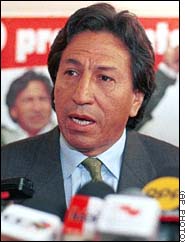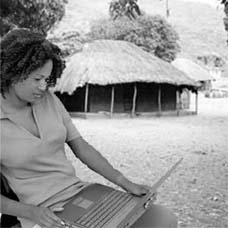
There must be times when Alejandro Toledo wishes he had been born an only child. In the three years since he was sworn in as president of Peru, Toledo has been rocked by a series of scandals involving five of his seven siblings, several nephews and nieces and, most recently, a sister-in-law.
The Peru Paradox
Toledo has boosted the economy. And he's more unpopular than ever.
By Joseph Contreras and Sharon Stevenson
Newsweek International
Dec. 13 issue - There must be times when Alejandro Toledo wishes he had been born an only child. In the three years since he was sworn in as president of Peru, Toledo has been rocked by a series of scandals involving five of his seven siblings, several nephews and nieces and, most recently, a sister-in-law. A brother named Pedro is under criminal investigation for allegedly using the family's name to land a lucrative telephone concession for a fledgling local company. Last February a congressional committee opened an investigation of the president's sister Margarita after press reports accused her of using the family name to help a friend win a construction contract with the national port authority. The president's sister-in-law Juana Rodriguez was arrested in October for her alleged role in a scheme to put six friends on the Education Ministry's payroll. A Toledo nephew is under investigation for rape. Toledo's relatives have stoutly denied the accusations, but the ensuing political fallout has further undermined the position of a president whose approval rating stands at a dismal 10 percent. "The cumulative effect of the scandals are enormous," says Michael Shifter of the Washington-based Inter-American Dialogue policy group. "[He should] thank God he doesn't have a bigger family."
In the minds of most Peruvians, the stench of scandal has eclipsed what has been a little-noticed but significant Toledo achievement: the Peruvian economy has been robust and in fact has outperformed the rest of Latin America over the past three years. The various inquiries have also raised serious questions about the sincerity and competence of a president who took office vowing to stamp out the rampant corruption of his disgraced predecessor Alberto Fujimori. "He has said publicly that in no way should the government's positive actions be confused with the isolated acts of a group of relatives," says senior presidential adviser Juan Sheput. "[But] we can't deny that it's caused a lot of damage."
To Toledo supporters, the 58-year-old president is getting a bum rap. The Stanford-educated former business-school professor has assembled a first-rate team of economic advisers, and foreign investors have responded by pouring large amounts of capital into the mining and energy sectors. The country's gross domestic product has grown at healthy rates of between 4 and 5 percent each year since 2001, and low inflation has helped boost the purchasing power of consumers. And by all accounts, the malfeasance inside the Toledo administration is less egregious than the corruption that flourished under Fujimori, who was recently accused by the Berlin-based watchdog group Transparency International of looting the country of $600 million. "When I compare his performance to previous Peruvian presidents, Toledo has been a good president who's been overly criticized," argues Cynthia McClintock, a Peru expert and professor at George Washington University.
What is to be made of this Peruvian paradox? Aside from the corruption scandals, Toledo catches flak because he isn't the populist he portrayed himself to be while running for president. On the campaign trail, Toledo said he'd create a million jobs and double the meager salaries of the country's public-school teachers. But once in office, the English-fluent technocrat charted a neoliberal course in economic policy that backed free trade and tried to privatize more inefficient government-owned companies. That inspired one of the more biting jokes about the country's first democratically elected president of Indian descent: "When Peruvians elected Fujimori, they thought they were getting a Japanese and wound up with a Peruvian. When they elected Toledo, they thought they were getting a —Peruvian and wound up with a gringo."
Ordinary Peruvians might take a kinder view of the president if he could improve the country's employment picture. For all the impressive macroeconomic growth in Peru, the formal jobless rate has actually risen during the Toledo era—from 9.2 percent in 2001 to 11 percent this year. The lion's share of new foreign investment has gone into capital-intensive projects like the $1.6 billion Camisea natural-gas pipeline, which has created relatively few new jobs. "There has been some good news happening on the economic front," says Augusto Alvarez, an economist and editor in chief of the influential Lima newspaper Peru 21. "But the people obviously haven't felt it, and Toledo remains a president who inspires little respect or esteem."
The ongoing legal entanglements of Toledo's relatives will only deepen the public disenchantment. According to press reports, the president's brother Pedro was slated to receive a $180,000 fee for helping a little-known Peruvian firm called Telecomunicaciones Hemisfericas beat out other competitors for a coveted land-line telephone concession from the government. The prosecuting attorney assigned to the case has indicted five officials of the Transport and Communications Ministry for irregularities in the awarding of the contract. Pedro Toledo has admitted working for the telecommunications company as a "broker," but he denies any wrongdoing and dismisses the recently opened criminal investigation as a politically inspired "witch hunt."
One of the criminal probes targeting Margarita Toledo has potentially more serious political implications. She's been accused of heading a team that forged voters' signatures in her Lima apartment in the late 1990s to get her brother's Peru Posible party onto the ballot for the 2000 general election. She denies the charge. A newspaper expose of similar practices by Fujimori's ruling party four years ago galvanized public opinion against the then incumbent. Both Margarita and the president have denied the charges—but if she is found guilty of falsifying signatures for her brother's benefit, it would call into question the legitimacy of Toledo's party and, by extension, his presidency.
Might such an outcome topple Toledo before his term expires in July 2006? Not likely, say most political analysts in Lima. Barring a new scandal, Toledo is being given a better than even chance of staggering to the finish line of his presidency. None of the politicians now being touted as a likely successor has generated much public enthusiasm. Indeed, according to an opinion survey released last week by the polling firm CPI, the man who would finish first in a presidential election today is none other than the exiled Alberto Fujimori, a fugitive from justice who's fighting Toledo's efforts to extradite him from Japan on nearly 20 criminal charges. That speaks volumes about the unhappiness in Peru today.
© 2004 Newsweek, Inc







